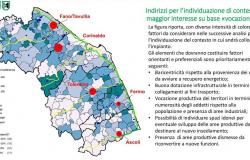These days Brussels is a 21st century Byzantium. The amount of rumours, off the record, background and ‘spin’ in the Belgian capital is such that one risks losing the thread. A fixed point: the agreement on ‘top jobs’, the top EU positions for the 2024-29 legislature, was leaked on Tuesday via the Dpa agency: the negotiators of Ppe, Pse and Renew agreed on the German Ursula von der Leyen, president of the European Commissionthe Portuguese Antonio Costa President of the European Council, the Estonian Kqja Kallas High Representative.
Meloni-Orban-Fiala out of agreement
So, the game is apparently already closed. Such a blatant preview of the agreement risks making today’s and tomorrow’s summit a formality, offending the sensibilities, but according to some, in a certain sense even playing into the hands of those who were left out of the agreement, such as the Prime Minister Giorgia Meloni, the Czech Prime Minister Petr Fiala, of the ECR, and the Hungarian Viktor Orban, who does not belong to any political family
Meloni tries to bang his fists on the table, he assures that in the risk of nominations his country will “bring home the result” without going around “with hat in hand”. And an ‘assist’ in view of the European summit also came from the President of the Republic Sergio Mattarella, who on the occasion of the working lunch at the Quirinale with the prime minister and ministers did not fail to make his voice heard: “We cannot ignore the ‘Italy”..
The informal dinner on 7 June had already gone badly: the leaders who had remained two hours waiting for the negotiators, together with the President of the European Council Charles Michel, as confirmed by a diplomatic source, had not taken it well, to put it mildly. If the Council today and Friday were to close the matter with a formal vote, the rupture would be dramatic. Of course it wouldn’t be the first time: in 2014 the British David Cameron and the Hungarian Viktor Orban voted against Jean-Claude Juncker; in 2019 Angela Merkel was warmly invited to abstain on her pupil, Ursula von der Leyen, pulled out of the hat after dropping, like so many little Indians, the Spitzenkandidaten. Among the latter was Manfred Weber, the kingmaker of appointments, whom Orban accused of playing a “diabolical” role.
The voting rules
On paper there is no game: the vote is by a strengthened qualified majority, that is, at least 20 member countries in favor, representing at least 65% of the population. EPP, PSE and Renew together have 22 heads of state and government, to which we can add, at the very least, Lithuanian President Gitana Nauseda. There is no way for the two from ECR (Giorgia Meloni and the Czech Petr Fiala), even by joining forces with Viktor Orban and the Slovak Peter Pellegrini (replacing Prime Minister Robert Fico, still recovering from the attack that almost cost him his life), to stop the agreement.
Of course, the European Council “always” tries to be “inclusive”, explains a senior EU official. However, he adds, “there are rules”, the strengthened qualified majority, and “we cannot prevent leaders from making agreements”, if they believe. He is not sure that a vote will be reached: “We will have to evaluate exactly where the leaders are at,” says the source. We will have to weigh, if necessary, “the reasons” that push a head of state or government to want the vote: in 2014 Cameron was happy, for internal political reasons, to oppose Juncker, so that public opinion of him knew.
On the part of the Presidency of the European Council there is a clear desire to keep the leaders on board as much as possible, also because Giorgia Meloni has always been collaborative at EU level. Even a European diplomatic source believes that “the broader the consensus” on top positions, the better it will be.”. With the Italian Prime Minister “we can work”, EU sources have repeatedly explained. However, “the treaty is the treaty, there are rules”, the senior EU official recalls: therefore, if EPP, PSE and Renew want to choose the hard line, they can do so. In this climate, it does not help that the President of the European Council Charles Michel, who notoriously has terrible relations with Ursula von der Leyen, is attributed with the desire to prevent a second mandate for the current tenant of the Berlaymont building.
Michel’s absence from the negotiations between the delegates of the EPP, PSE and Renew on 7 June is symptomatic. And it had the result that the ‘external’ leaders, those of the ECR and the independents, were left without an indispensable ‘trait d’union’ with the majority. Not even the agenda of tomorrow’s summit is very clear. The few certainties are that it will start earlier than usual, around 2pm (doorstep between 12.30pm and 1.30pm), with the Ukrainian president Volodymyr Zelensky, who will be physically present at the summit, to sign an agreement regarding the EU’s commitments to the security of Ukraine.
Afterwards, as usual, the President of the European Parliament, Roberta Metsola, will speak. Subsequently, we should talk about Ukraine, the Middle East, security and defense, competitiveness, migration, Montenegro, the Black Sea, Moldova, Georgia, hybrid threats and pure threats to fight anti-Semitism and xenophobia. There is also the roadmap for future internal reforms. In all, for now there are 49 points of conclusions, plus the attached strategic agenda, at least according to the latest (mileage) draft. The ambassadors are trying to ‘close’ the text as much as possible, to limit the possibility of long discussions between the leaders, which in any case are highly probable, given the highly divisive nature of some issues.
Only afterwards, at dinner, is it expected that we will talk about top positions and the strategic agenda for this legislature. It is not even clear whether the heads of state and government will discuss the first or second elections: “We are still evaluating,” says the senior official. A diplomatic source predicts that the discussion on ‘top jobs’ will continue on Friday. The match, he observes, was managed as if it were at a national level.
The fact is that, if the EPP, PSE and Renew dominate the European Council, at least to date, the European Parliament lacks votes to pass Ursula von der Leyen, who in 2019 passed by just 9 votes, thanks to the Pis and the Cinquestelle. According to a diplomatic source, the Commission estimates that the majority could register a snipers rate of around 15%, which means that the 399 votes available on paper are not at all sufficient to be safe. Von der Leyen needs at least 361 votes, and she doesn’t have them. If the agreement on appointments passes in the European Council, she will have to seek other support to ensure her re-election. There are no plans for a second attempt: if it fails, leaders will have to find another president. It would be a disaster for the EU, which wants to prove that it is capable of deciding.
What Meloni could do
Von der Leyen will probably also knock on Meloni’s door, which can guarantee her at least 24 votes: many are the elected members of the Brothers of Italy, one of the largest delegations in the entire Parliament. In reality it is already knocking, and for some time: the number of personal visits to Italy by the president in office attests to this with some clarity. Furthermore, the letter on migration to the Heads of State and Government contains several points that are unlikely to displease the Prime Minister, starting from a clear openness to the study, in this legislature, of ways to examine asylum requests “far” from external borders of the EU.
However, the Prime Minister will decide what to do. Abstention, in the event of a vote, is a possibility, but there is no decision, at least so far, according to a diplomatic source. There is an ongoing discussion, even in the majority (which in the EU is distributed across three different political groups, one of which, the EPP, leads the European majority and the other two, ECR and ID, in opposition) and It was, as usual on the eve of summits, a breakfast at the Quirinale. The prime minister will decide how to act based on all these elements.
However the European Council on appointments ends up, the game will move to Strasbourg, shortly after mid-July, where the numbers are much less solid than at the Europa Building. It is probable that von der Leyen will look for them on the right, in the ECR, and on the left, among the Greens, without however formally opening the majority to either of them. Yesterday again, the socialist group leader Iratxe Garcia Perez repeated for the umpteenth time that a collaboration with the ECR is an insurmountable “red line” for the Socialists. But, in the words of Renew MEP Sandro Gozi, the Brothers of Italy certainly cannot be prevented from “doing the right thing”, voting for von der Leyen. The important thing, in Renew’s eyes, is that the ECR votes are not decisive.
After all, the Polish Pis voted for von der Leyen in 2019, when they were in government, and Fdi, also in the ECR, understood perfectly. Speaking of Ecr, the group was supposed to hold its founding meeting today, but it was postponed by a week, to July 3rd. As for the rest of the conclusions, the release of military aid to Ukraine through the EPF, the extra-budgetary instrument used to support Kiev, which has been blocked for months by Hungary’s veto, is not expected. Hungary which, to date, has not announced vetoes on the strategic agenda, despite asking for amendments that are sometimes impossible to accept. “We’ll see,” the senior EU official simply says.
On Georgia, the leaders will send a “clear” message to Tbilisi, and in particular to Georgian public opinion, to highlight that the path taken by the government, with the so-called ‘Russian law’, distances the country from EU membership. It is necessary to clarify this at the highest level, also because various Georgian media tend to convey the opposite message to public opinion.





